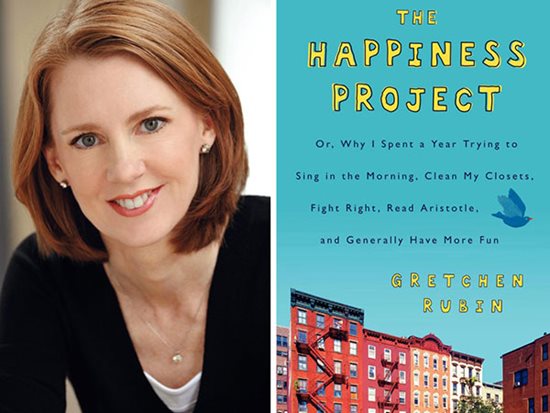6 February 2013
The science and philosophy behind the happiness movement
By Henry DeVries
 Many of the greatest minds have tackled the question of happiness: Plato, Henry David Thoreau, Bertrand Russell, the Dalai Lama, Leo Tolstoy, and Blaise Pascal, just to list a few.
Many of the greatest minds have tackled the question of happiness: Plato, Henry David Thoreau, Bertrand Russell, the Dalai Lama, Leo Tolstoy, and Blaise Pascal, just to list a few.
Gretchen Rubin decided to spend a year test-driving the wisdom of the ages, the current scientific studies, and the lessons from pop culture about how to be happier. At the end of her study, Rubin wrote a book entitled The Happiness Project. How does she respond to critics who think that gimmick is tired and obvious?
“There are a lot of great names for this ‘year of’ approach,” says Rubin. “I’ve seen it called ‘schtick lit’ and ‘method journalism’ and ‘stunt journalism‘ and ‘annualism.’ Of course, this approach isn’t new. Thoreau moved to Walden Pond in 1845, where he did a two-year project, instead of a one-year project, but the idea was the same.”
Rubin was clerking for Supreme Court Justice Sandra Day O’Connor when she realized she really wanted to quit law and become an author. Since then, she has written bestsellers about JFK, Winston Churchill, and one entitled Power Money Fame Sex. But it’s The Happiness Project, the volume with the subtitle “Or Why I Spent a Year Trying to Sing in the Morning, Clean My Closets, Fight Right, Read Aristotle, and Generally Have More Fun,” that has brought her widespread acclaim.
Rubin believes the “year of…” approach resonates with people. “A year feels like the right length of time for an ‘experiment in living,’ to borrow Thoreau’s phrase. A year feels like enough time for real change to be possible—but manageable. At a book conference recently, A.J. Jacobs (The Year of Living Biblically) and Robyn Okrant (Living Oprah) and I were joking that we should start a union for writers following this approach.”
One of the themes in her book is that a key to happiness is to stimulate your mind in new ways. During her year, she experimented with learning different technologies and skills, everything from art to computer programs. Putting happiness into action often requires branching out and learning something new.
Her research also showed something surprising: although she found tremendous value in the scientific and philosophical works she studied, in the end, Rubin gleaned more from books like Benjamin Franklin’s Autobiography, Viktor Frankl’s Man’s Search for Meaning, and Anne Lamott’s Operating Instructions.
In her books and blogs, Rubin gives readers tips on rearranging their daily lives, guided by what she calls Four Splendid Truths: “First: To be happier, you have to think about feeling good, feeling bad, and feeling right, in an atmosphere of growth. Second: One of the best ways to make yourself happy is to make other people happy; one of the best ways to make other people happy is to be happy yourself. Third: The days are long, but the years are short. Fourth: You’re not happy unless you think you’re happy.”
Rubin says the laws of happiness are as fixed as the laws of chemistry. “I’m trying to understand and embrace them; I’m not making them up. I’m not going to come up with something more profound than ‘Know thyself’ or ‘The greatest of these is love.’ Everything important has been said before; in fact, it was Alfred North Whitehead who said, ‘Everything important has been said before.’ The challenge comes from understanding how to put great truths into action ourselves, in our own lives.”

Well-known author Gretchen Rubin shared the stage during the second annual “The Atlantic Meets the Pacific” conference, a three-day series of conversations co-hosted by UC San Diego Extension and the 155-year-old The Atlantic magazine, with such luminaries as genome pioneer J. Craig Venter; Steven Spielberg's partner Stacey Snider, CEO of DreamWorks Studios; Jane McGonigal, world-renowned designer of alternate reality games; Chris Cox, the vice president of product development at Facebook; and Jessica Jackley, the entrepreneur who pioneered peer-to-peer micro-lending through her start-up Kiva. Videos of The Atlantic editors interviewing Rubin and the other newsmakers at the event—in such fields as science, medicine, energy development, and human interaction—are available for free viewing at uctv.tv.